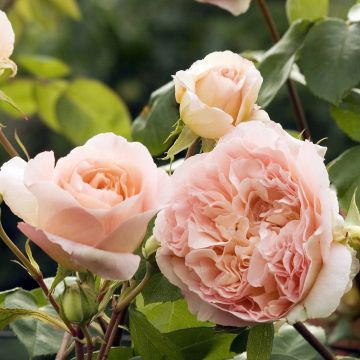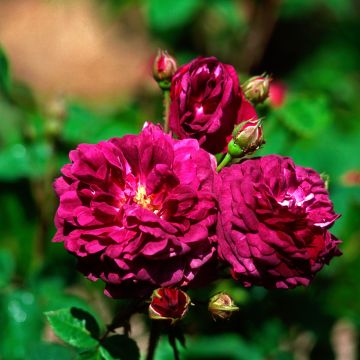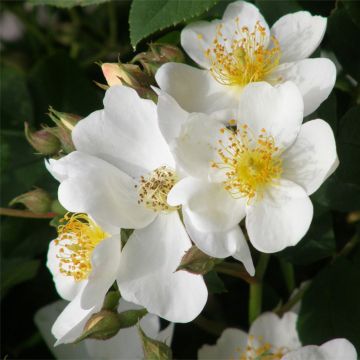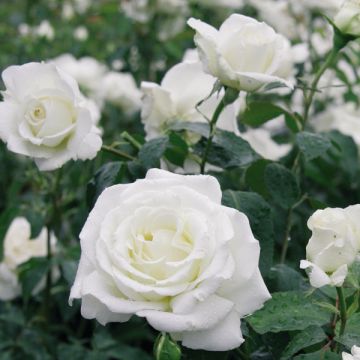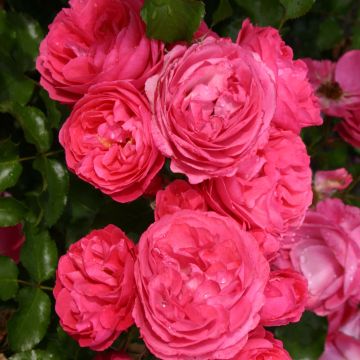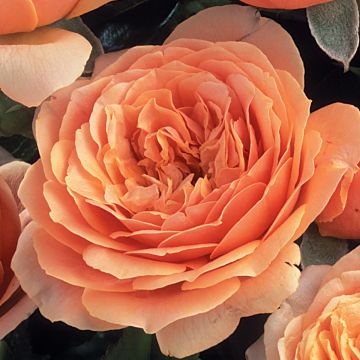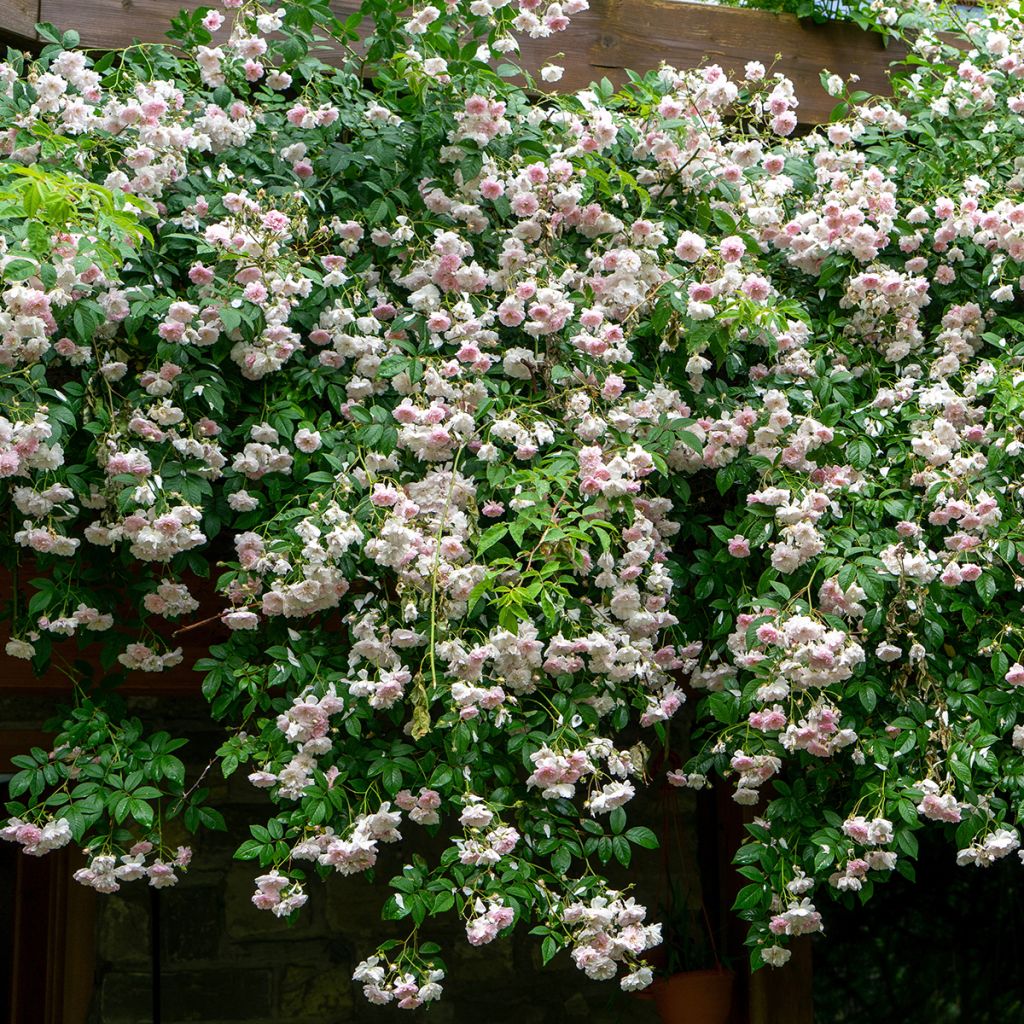

Rosa x moschata 'Paul's Himalayan Musk' - Rambling Rose
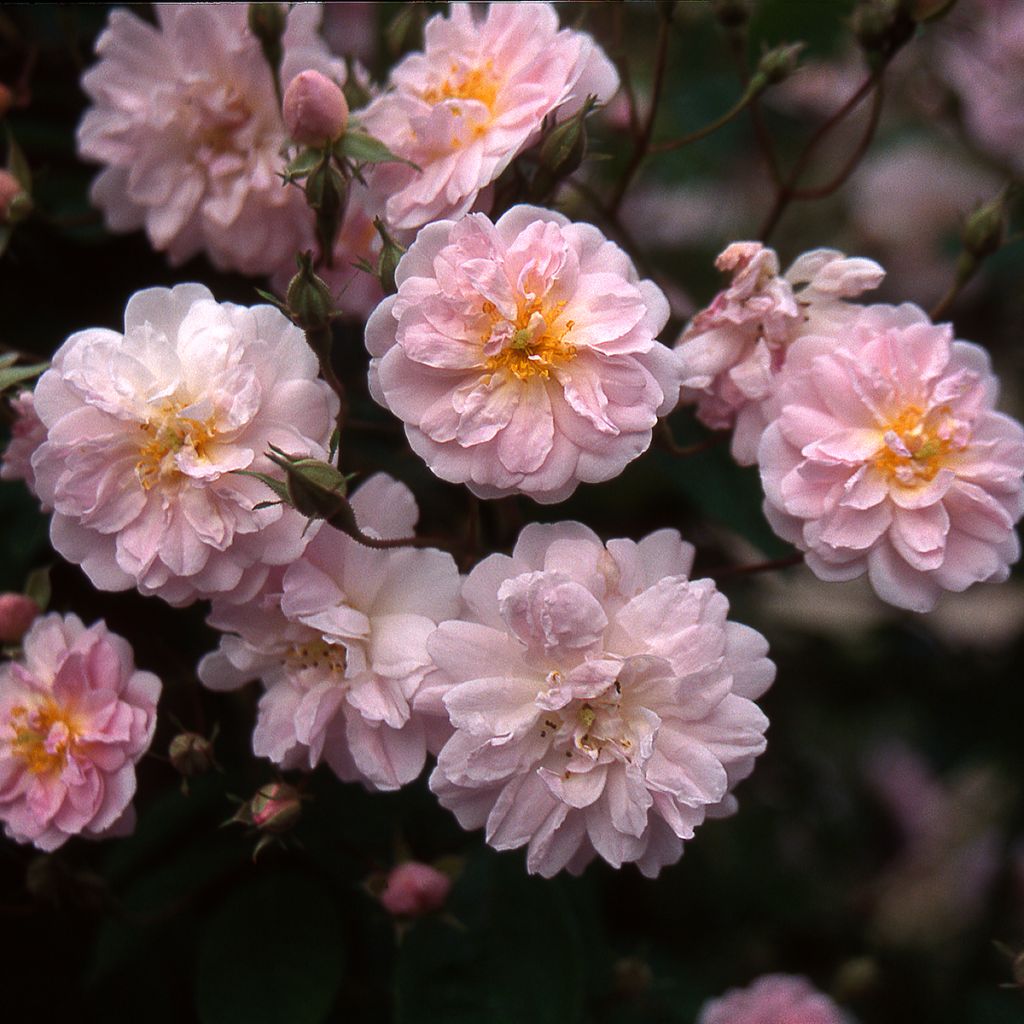

Rosa x moschata 'Paul's Himalayan Musk' - Rambling Rose
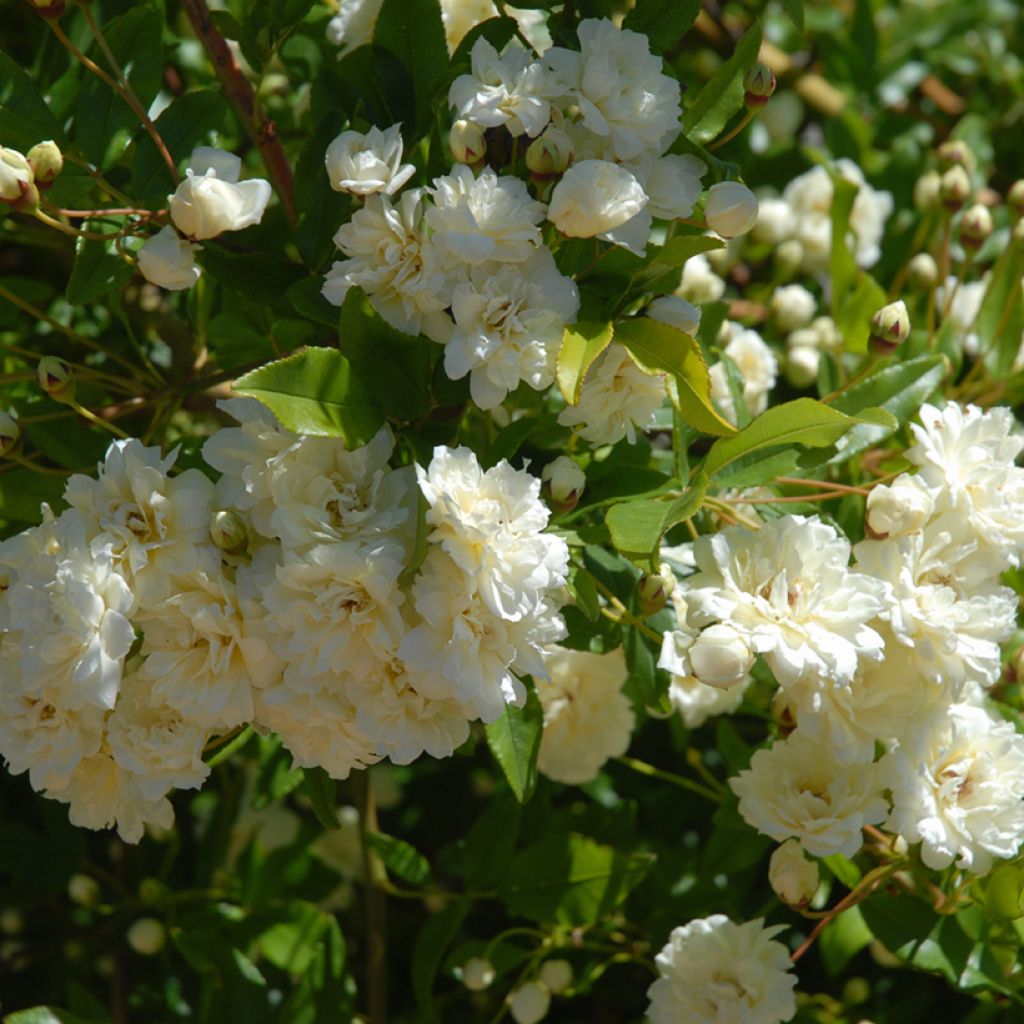

Rosa x moschata 'Paul's Himalayan Musk' - Rambling Rose
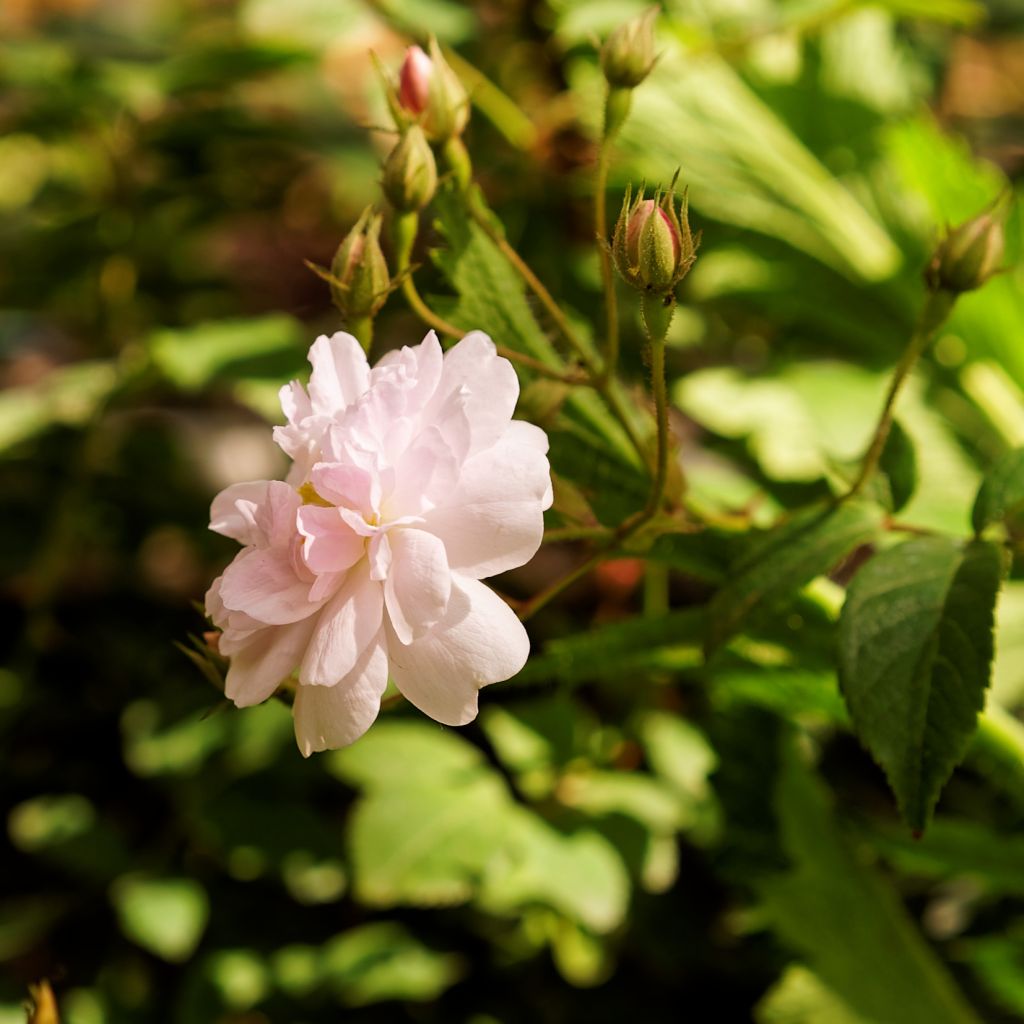

Rosa x moschata 'Paul's Himalayan Musk' - Rambling Rose
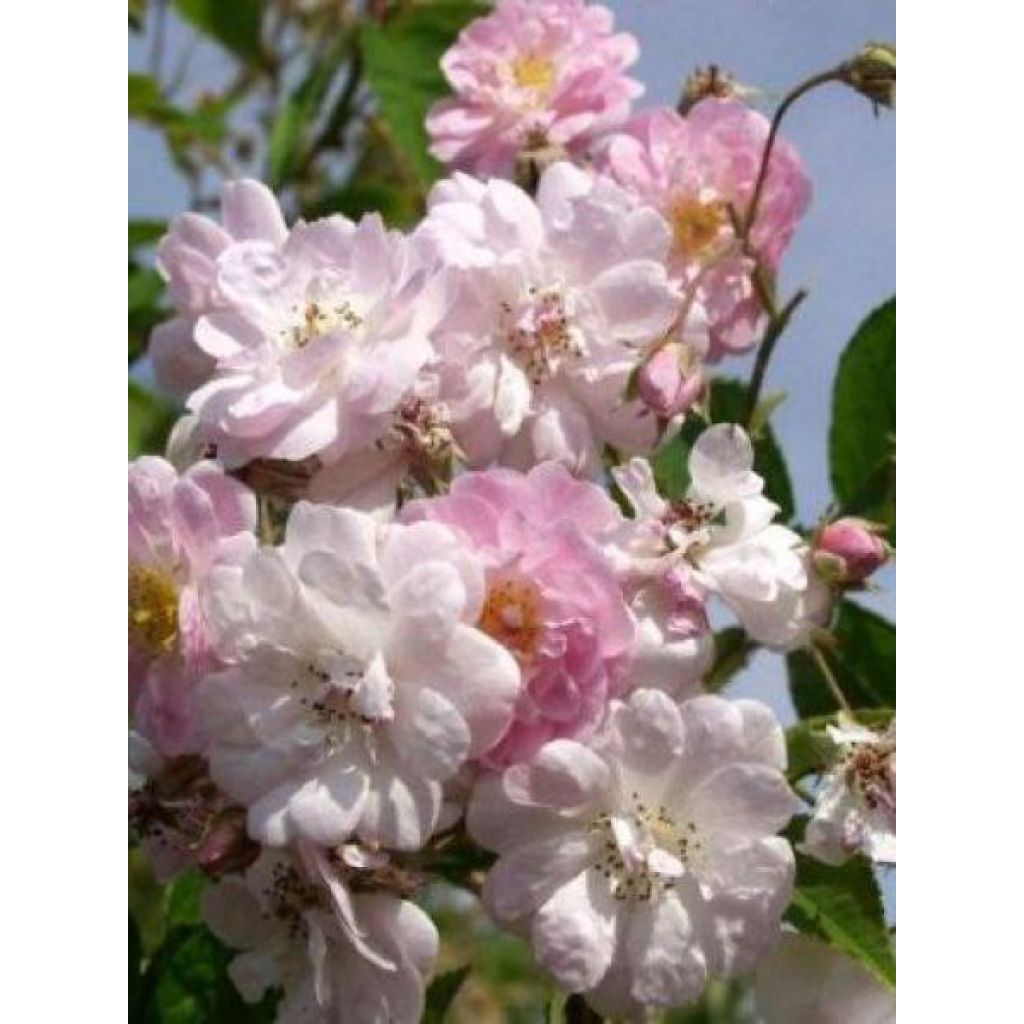

Rosa x moschata 'Paul's Himalayan Musk' - Rambling Rose
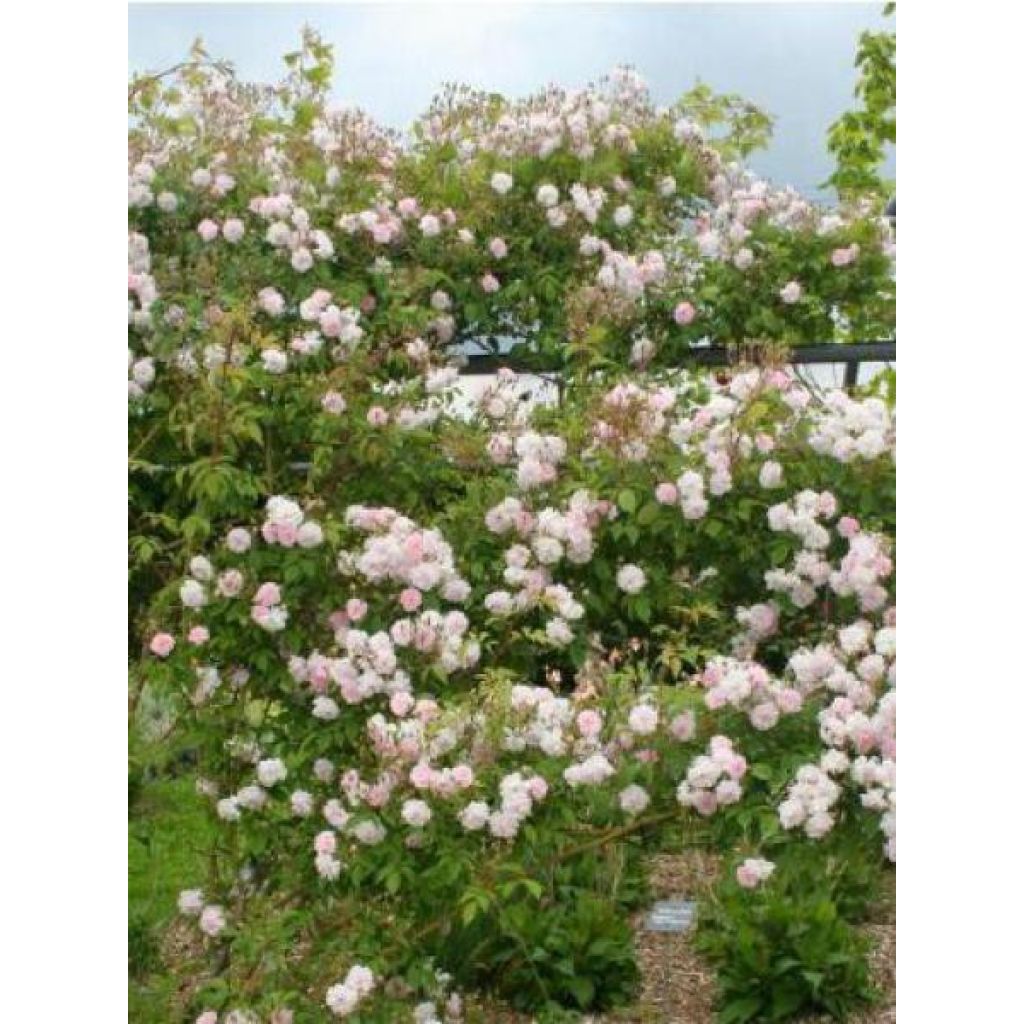

Rosa x moschata 'Paul's Himalayan Musk' - Rambling Rose
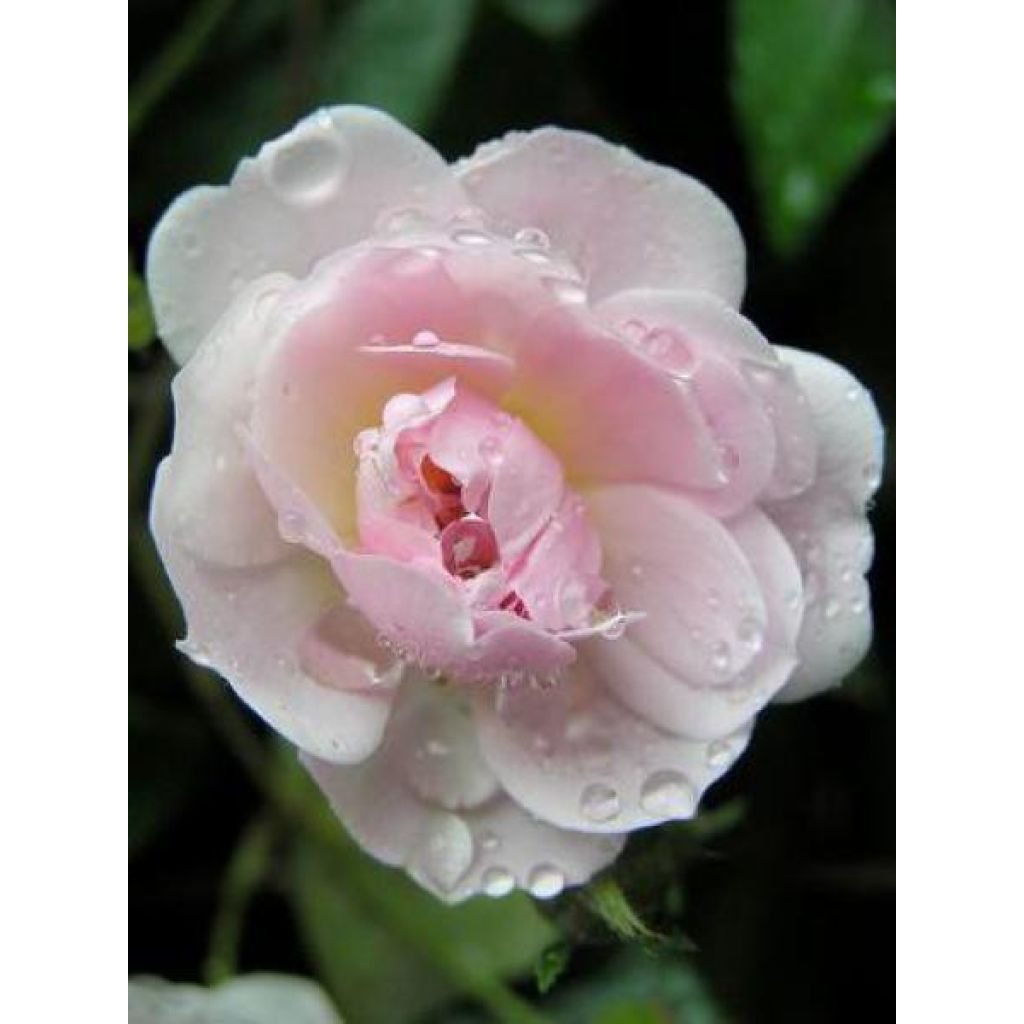

Rosa x moschata 'Paul's Himalayan Musk' - Rambling Rose
View more pictures
Hide images
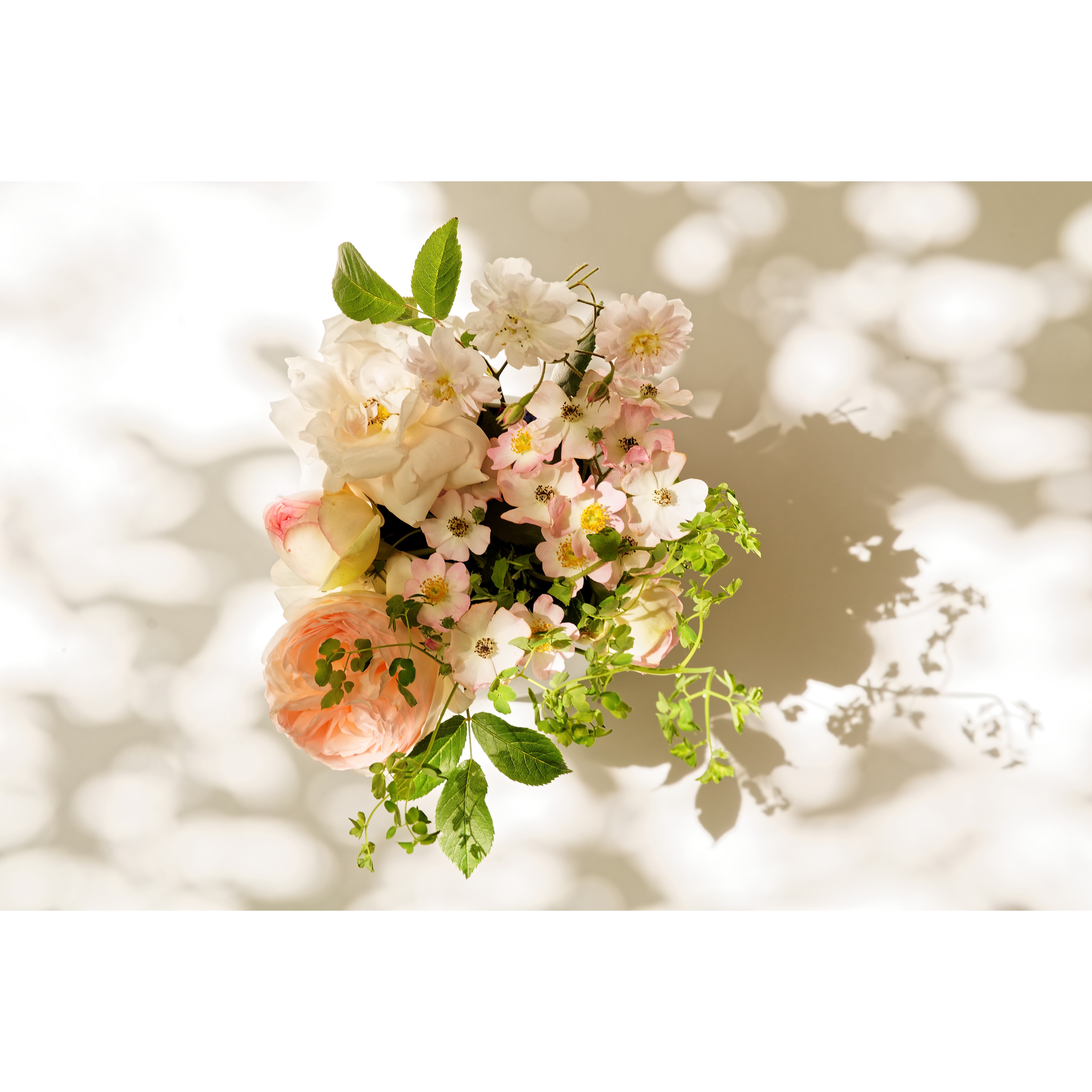
Delia C.

No translation needed as the customer review does not contain any text.
Delia C. • 33 FR
Rosa x moschata 'Paul's Himalayan Musk' - Rambling Rose
Rosa x moschata Paul's Himalayan Musk
Rambling Rose
Parcel arrived quickly. Very satisfied, I repotted it in a pot while waiting to bring it down to the garden in the south. It's already budding. The honeysuckle is doing well too.
Martine, 11/02/2025
Special offer!
Receive a €20 voucher for any order over €90 (excluding delivery costs, credit notes, and plastic-free options)!
1- Add your favorite plants to your cart.
2- Once you have reached €90, confirm your order (you can even choose the delivery date!).
3- As soon as your order is shipped, you will receive an email containing your voucher code, valid for 3 months (90 days).
Your voucher is unique and can only be used once, for any order with a minimum value of €20, excluding delivery costs.
Can be combined with other current offers, non-divisible and non-refundable.
Home or relay delivery (depending on size and destination)
Schedule delivery date,
and select date in basket
This plant carries a 6 months recovery warranty
More information
We guarantee the quality of our plants for a full growing cycle, and will replace at our expense any plant that fails to recover under normal climatic and planting conditions.


Description
The 'Paul's Himalayan Musk' climbing rose, which originated in 1916 from unknown parents, is an exceptional plant firstly because of its extraordinary size and vigour but also because of the musky and powerful scent of its unique flowering, which covers it in June with generous bouquets of small semi-double flowers in pale lilac pink. The flexible stems of this rose are adorned with light but lush foliage, which defends itself well against rose diseases despite its graceful appearance. Hardy and not demanding in terms of soil, even when grown on its own roots, it is resistant to heat and summer drought once established, and it withstands competition from tree roots well. The only flaw of this giant is that it becomes gigantic, especially in fertile and moist soil. Give it a large tree just for itself and the spectacle it will offer you!
The Paul's Himalayan Musk' rose is the result of a fortunate accident: it was spotted by the famous English rose breeder W.Paul, captivated by its exuberant and tender pink flowering, whose rather extraordinary musky scent reveals its relationship with hybrid musk roses. This scent is particularly noticeable and volatile in the afternoon, sun, and hot and calm weather. Under good growing conditions, its long trailing branches can exceed 10m (33ft). They bear numerous thorns and deciduous foliage, abundant and divided into many small, serrated leaflets of a matte green, medium to light. The young shoots are slightly tinged with purple. The non-repeating flowering occurs from May to July, depending on the climate. It is distinguished by its abundance, as with single-flowered roses often. Each branch produces delicate, somewhat loose and trailing bouquets composed of small semi-double rosette flowers measuring 4cm (2in) in diameter. Each flower has 6 to 19 rose-lilac petals at the opening, which lighten as they bloom. Note that the flowers are a more vivid pink when exposed to bright light, while they are almost white in partial shade. This flowering is followed by the formation of small red-orange fruits called hips.
In the lineage of filipes, 'Bobbie James', longicuspis...Paul's Himalayan Musk rose is a very large rambling rose that requires space to grow properly and show its full potential. Its vigour allows it to conquer the tallest trees, especially in rich soils, and become the garden star for three weeks in summer. Through regular and judicious pruning, it is possible to keep it in reasonable proportions, which allows it to be trained as a large bush measuring 2.50m (8ft) and admired as a standalone plant on a lawn. It can also be planted in an ageing and slightly sparse conifer hedge or allowed to scramble over unsightly buildings. It can even be intermingled through a robust Chinese wisteria. With their fragrant and staggered flowering, this duel of titans should create a sensational tableau in a large garden.
Report an error about the product description
Rosa x moschata 'Paul's Himalayan Musk' - Rambling Rose in pictures


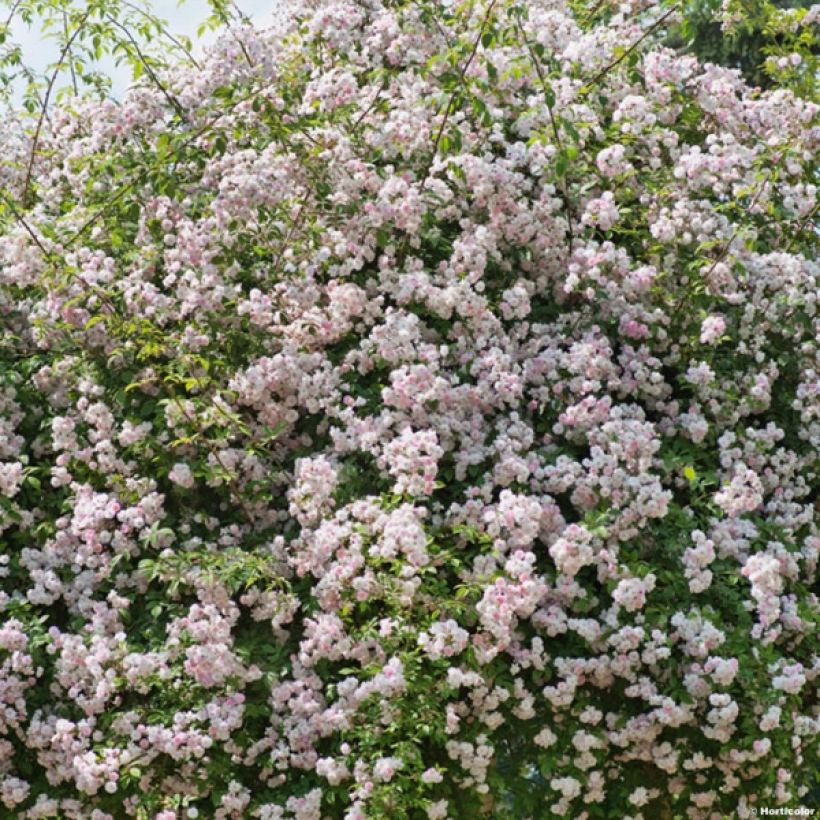

Plant habit
Flowering
Foliage
Botanical data
Rosa
x moschata
Paul's Himalayan Musk
Rosaceae
Rambling Rose
Cultivar or hybrid
Rosa canina Laxa (Wrapped bare root, 4L/5L pot)
Planting and care
The 'Paul's Himalayan Musk' rose adapts to any soil, even heavy or sandy, as long as the planting is well taken care of, it does not lack water to establish itself, and it has enough nutrients. Plant it in well-prepared and well-drained ordinary soil and in a sunny or partially shaded position that tolerates well in hot climates. Plant it in autumn, never when it is freezing. When planted in the shade of a tree, it will take longer to start growing. The 2-year-old branches are the most floriferous. It is useful to cut back the stems that flowered the previous year to 3 or 4 buds, or pruned to 15 cm (6in). The new sturdy stems should be trained, and the old ones removed if necessary. Fairly hardy, this rose can withstand -15°C (5°F), and if, despite everything, after a harsh winter, the branches freeze to the ground, this rambler will regrow from the base in spring. Removing dead wood in winter and removing faded flowers if hips are not desired may be useful. If necessary, light pruning can be carried out in spring after the risk of frost.
Alternatively, climbing roses can grow freely if there is ample space. If you plant a climbing rose next to a living tree, the rose's root system will compete with that of the already well-established tree. To control watering, a trick: plant the rose in a large container with a perforated bottom, at the tree's base - the tree's roots will not penetrate the container for at least a year. Remove the container after 1 year, for example, by cutting one side without disturbing the rose's root system. By then, it will have had time to develop its root system and be more resistant deeply.
Note that this rose, which is quite difficult to propagate from cuttings, grows very well on its own roots in ordinary soil.
Roses may develop unsightly spots at the end of summer, but this is a natural occurrence and doesn't harm the rose's growth.
Planting period
Intended location
Care
-
, onOrder confirmed
Reply from on Promesse de fleurs
Similar products
Haven't found what you were looking for?
Hardiness is the lowest winter temperature a plant can endure without suffering serious damage or even dying. However, hardiness is affected by location (a sheltered area, such as a patio), protection (winter cover) and soil type (hardiness is improved by well-drained soil).

Photo Sharing Terms & Conditions
In order to encourage gardeners to interact and share their experiences, Promesse de fleurs offers various media enabling content to be uploaded onto its Site - in particular via the ‘Photo sharing’ module.
The User agrees to refrain from:
- Posting any content that is illegal, prejudicial, insulting, racist, inciteful to hatred, revisionist, contrary to public decency, that infringes on privacy or on the privacy rights of third parties, in particular the publicity rights of persons and goods, intellectual property rights, or the right to privacy.
- Submitting content on behalf of a third party;
- Impersonate the identity of a third party and/or publish any personal information about a third party;
In general, the User undertakes to refrain from any unethical behaviour.
All Content (in particular text, comments, files, images, photos, videos, creative works, etc.), which may be subject to property or intellectual property rights, image or other private rights, shall remain the property of the User, subject to the limited rights granted by the terms of the licence granted by Promesse de fleurs as stated below. Users are at liberty to publish or not to publish such Content on the Site, notably via the ‘Photo Sharing’ facility, and accept that this Content shall be made public and freely accessible, notably on the Internet.
Users further acknowledge, undertake to have ,and guarantee that they hold all necessary rights and permissions to publish such material on the Site, in particular with regard to the legislation in force pertaining to any privacy, property, intellectual property, image, or contractual rights, or rights of any other nature. By publishing such Content on the Site, Users acknowledge accepting full liability as publishers of the Content within the meaning of the law, and grant Promesse de fleurs, free of charge, an inclusive, worldwide licence for the said Content for the entire duration of its publication, including all reproduction, representation, up/downloading, displaying, performing, transmission, and storage rights.
Users also grant permission for their name to be linked to the Content and accept that this link may not always be made available.
By engaging in posting material, Users consent to their Content becoming automatically accessible on the Internet, in particular on other sites and/or blogs and/or web pages of the Promesse de fleurs site, including in particular social pages and the Promesse de fleurs catalogue.
Users may secure the removal of entrusted content free of charge by issuing a simple request via our contact form.
The flowering period indicated on our website applies to countries and regions located in USDA zone 8 (France, the United Kingdom, Ireland, the Netherlands, etc.)
It will vary according to where you live:
- In zones 9 to 10 (Italy, Spain, Greece, etc.), flowering will occur about 2 to 4 weeks earlier.
- In zones 6 to 7 (Germany, Poland, Slovenia, and lower mountainous regions), flowering will be delayed by 2 to 3 weeks.
- In zone 5 (Central Europe, Scandinavia), blooming will be delayed by 3 to 5 weeks.
In temperate climates, pruning of spring-flowering shrubs (forsythia, spireas, etc.) should be done just after flowering.
Pruning of summer-flowering shrubs (Indian Lilac, Perovskia, etc.) can be done in winter or spring.
In cold regions as well as with frost-sensitive plants, avoid pruning too early when severe frosts may still occur.
The planting period indicated on our website applies to countries and regions located in USDA zone 8 (France, United Kingdom, Ireland, Netherlands).
It will vary according to where you live:
- In Mediterranean zones (Marseille, Madrid, Milan, etc.), autumn and winter are the best planting periods.
- In continental zones (Strasbourg, Munich, Vienna, etc.), delay planting by 2 to 3 weeks in spring and bring it forward by 2 to 4 weeks in autumn.
- In mountainous regions (the Alps, Pyrenees, Carpathians, etc.), it is best to plant in late spring (May-June) or late summer (August-September).
The harvesting period indicated on our website applies to countries and regions in USDA zone 8 (France, England, Ireland, the Netherlands).
In colder areas (Scandinavia, Poland, Austria...) fruit and vegetable harvests are likely to be delayed by 3-4 weeks.
In warmer areas (Italy, Spain, Greece, etc.), harvesting will probably take place earlier, depending on weather conditions.
The sowing periods indicated on our website apply to countries and regions within USDA Zone 8 (France, UK, Ireland, Netherlands).
In colder areas (Scandinavia, Poland, Austria...), delay any outdoor sowing by 3-4 weeks, or sow under glass.
In warmer climes (Italy, Spain, Greece, etc.), bring outdoor sowing forward by a few weeks.






























